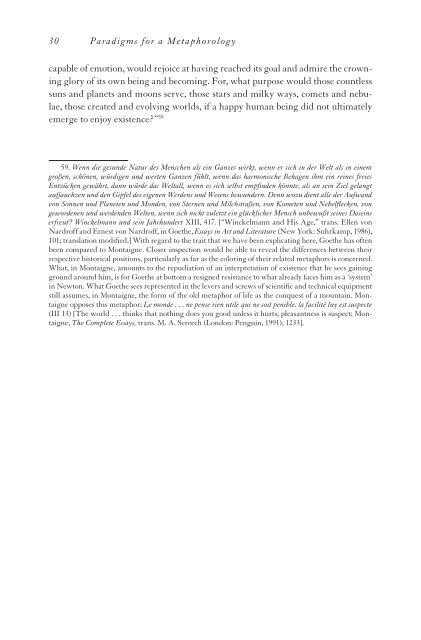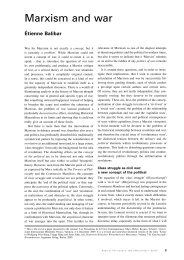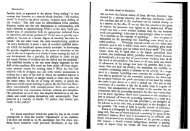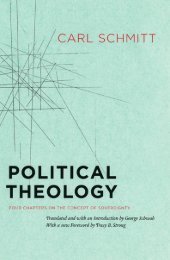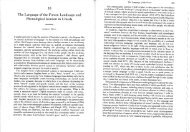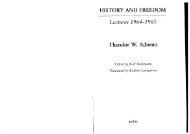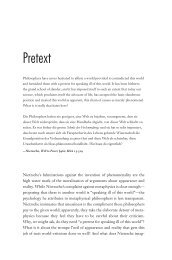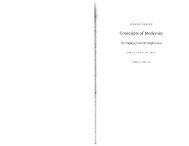Paradigms for a metaphorology.pdf - Townsend Humanities Lab
Paradigms for a metaphorology.pdf - Townsend Humanities Lab
Paradigms for a metaphorology.pdf - Townsend Humanities Lab
Create successful ePaper yourself
Turn your PDF publications into a flip-book with our unique Google optimized e-Paper software.
30 <strong>Paradigms</strong> <strong>for</strong> a Metaphorology<br />
capable of emotion, would rejoice at having reached its goal and admire the crowning<br />
glory of its own being and becoming. For, what purpose would those countless<br />
suns and planets and moons serve, those stars and milky ways, comets and nebulae,<br />
those created and evolving worlds, if a happy human being did not ultimately<br />
emerge to enjoy existence?” 59<br />
59. Wenn die gesunde Natur des Menschen als ein Ganzes wirkt, wenn er sich in der Welt als in einem<br />
großen, schönen, würdigen und werten Ganzen fühlt, wenn das harmonische Behagen ihm ein reines freies<br />
Entzücken gewährt, dann würde das Weltall, wenn es sich selbst empfinden könnte, als an sein Ziel gelangt<br />
aufjauchzen und den Gipfel des eigenen Werdens und Wesens bewundern. Denn wozu dient alle der Aufwand<br />
von Sonnen und Planeten und Monden, von Sternen und Milchstraßen, von Kometen und Nebelflecken, von<br />
gewordenen und werdenden Welten, wenn sich nicht zuletzt ein glücklicher Mensch unbewußt seines Daseins<br />
erfreut? Winckelmann und sein Jahrhundert XIII, 417. [“Winckelmann and His Age,” trans. Ellen von<br />
Nardroff and Ernest von Nardroff, in Goethe, Essays in Art and Literature (New York: Suhrkamp, 1986),<br />
101; translation modified.] With regard to the trait that we have been explicating here, Goethe has often<br />
been compared to Montaigne. Closer inspection would be able to reveal the differences between their<br />
respective historical positions, particularly as far as the coloring of their related metaphors is concerned.<br />
What, in Montaigne, amounts to the repudiation of an interpretation of existence that he sees gaining<br />
ground around him, is <strong>for</strong> Goethe at bottom a resigned resistance to what already faces him as a ‘system’<br />
in Newton. What Goethe sees represented in the levers and screws of scientific and technical equipment<br />
still assumes, in Montaigne, the <strong>for</strong>m of the old metaphor of life as the conquest of a mountain. Montaigne<br />
opposes this metaphor: Le monde . . . ne pense rien utile qui ne soit penible: la facilité luy est suspecte<br />
(III 13) [The world . . . thinks that nothing does you good unless it hurts; pleasantness is suspect; Montaigne,<br />
The Complete Essays, trans. M. A. Screech (London: Penguin, 1991), 1233].


